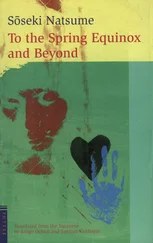Natsume Soseki - Kusamakura
Здесь есть возможность читать онлайн «Natsume Soseki - Kusamakura» весь текст электронной книги совершенно бесплатно (целиком полную версию без сокращений). В некоторых случаях можно слушать аудио, скачать через торрент в формате fb2 и присутствует краткое содержание. Жанр: Старинная литература, на английском языке. Описание произведения, (предисловие) а так же отзывы посетителей доступны на портале библиотеки ЛибКат.
- Название:Kusamakura
- Автор:
- Жанр:
- Год:неизвестен
- ISBN:нет данных
- Рейтинг книги:4 / 5. Голосов: 1
-
Избранное:Добавить в избранное
- Отзывы:
-
Ваша оценка:
- 80
- 1
- 2
- 3
- 4
- 5
Kusamakura: краткое содержание, описание и аннотация
Предлагаем к чтению аннотацию, описание, краткое содержание или предисловие (зависит от того, что написал сам автор книги «Kusamakura»). Если вы не нашли необходимую информацию о книге — напишите в комментариях, мы постараемся отыскать её.
Kusamakura — читать онлайн бесплатно полную книгу (весь текст) целиком
Ниже представлен текст книги, разбитый по страницам. Система сохранения места последней прочитанной страницы, позволяет с удобством читать онлайн бесплатно книгу «Kusamakura», без необходимости каждый раз заново искать на чём Вы остановились. Поставьте закладку, и сможете в любой момент перейти на страницу, на которой закончили чтение.
Интервал:
Закладка:
“See that patch of purple below the dark green part?â€
“That shadowy bit?â€
“Is it shadow? It looks like a bald patch to me.â€
“Come now, it’s a hol ow. If it was bald, it would have more brown in it.â€
“Is that so? Anyway, Tengu Rock is apparently in behind that.â€
“So the Seven Bends would be a little farther to the left, then.â€
“They’re way off somewhere else, on a mountain behind that one.â€
“Ah yes, that’s true. But I’d guess they’re about where that bit of cloud is hanging.â€
“Yes, that’s the direction.â€
At this point the elbow of the old man slips from the edge of the boat where he’s propped it to doze, and he awakens with a start.
“Not there yet?â€
He stretches, chest out, right elbow drawn back, left arm thrust straight before him, then does an imitation of releasing an arrow from the bow.
Nami chuckles.
“Don’t mind me, it’s a habit of mine.â€
I too laugh. “I see you like archery,†I remark.
“I could draw a good thick bow in my youth,†he replies, patting his left shoulder, “and even now my left-hand action is stil remarkably steady.â€
Up in the bow, the talk of war is in ful swing.
At length, the boat enters a townscape. I notice a sign painted on the low paper window of a little bar, “Drinks and Snacks,†and farther on an old-fashioned tavern. We pass a lumberyard. Occasional y the sound of a rickshaw comes from the road beyond. Swal ows twist and twitter in the air; geese honk.
Now our little party leaves the boat, and we make our way to the station.
We are being dragged yet deeper into the real world, which I define as the world that contains trains. Nothing can be more quintessential y representative of twentieth-century civilization than the steam train. It roars along, packed tight with hundreds of people in the one box, merciless in its progress, and al those hundreds crammed in there must travel at the same speed, stop at the same places, and submit to a baptismal submersion in the same swirling steam. Some say that people “ride†in a train, but I would say they are thrust into it; some speak of “going†by train, but it seems to me they are transported by it. Nothing is more disdainful of individuality. Having expended al its means to develop the individual, civilization then proceeds to crush it by al possible means. Present civilization gives each person his little patch of earth and tel s him he may wake and sleep as he pleases on it—but then it throws up an iron railing around it, and threatens us with dire consequences if we should put a foot outside this barrier. Those who can act as they please in their own little patch natural y feel the urge to do the same beyond it, so the pitiful citizens of this world spend their days biting and raging at the boundary fence that hems them in. Civilization, having given individuals their freedom and turned them into wild beasts thereby, then maintains the peace by throwing these unfortunates behind bars. This isn’t real peace, it’s the peace of the zoo, where the tiger lies in his cage glaring out at the gaping sightseers. Should one bar of that cage come loose, the world would fal apart. Then we wil have our second French Revolution. Indeed, the revolution is already under way night and day among individuals; the great European playwright Ibsen has provided us with detailed examples of the conditions necessary for it to occur. I must say, whenever I see one of those fierce trains hurtling along, treating al on board indiscriminately as so much freight, and mental y balance the individuals crammed in there against the train’s utter disregard for their individuality—I can only say, Watch out, this could be nasty if you’re not careful! Modern civilization in fact reeks of such dangers. The steam train hurtling blindly into the darkness ahead is simply one of them.
I sit in a tea shop at the station, staring thoughtful y at the piece of cake before me as I ponder this train theory of mine. I can’t very wel write it down in my sketchbook, and I feel no need to talk to anyone about it, so I simply sit here in silence, eating my cake and drinking my tea.
Opposite me are two men. Both wear straw sandals, one has a red blanket over his shoulders, and the other is dressed in pale green workman’s trousers with patches at the knees, to which he presses his hands.
“No good, eh?â€
“No good.â€
“We oughta have two stomachs, eh, like a cow.â€
“That’d be the answer. One goes wrong, you just cut it out.â€
This country fel ow is apparently suffering from stomach problems. The stench blowing from the Manchurian battle-fields has not reached these men’s nostrils; nor do they understand the evils of modern civilization. They know nothing of such matters as revolution; indeed, they haven’t so much as heard the word. They’re stil at the stage where they can seriously entertain the possibility of having two stomachs. I take out my sketchbook and set about sketching the two figures.
A bel begins to clang. The ticket is already bought.
“Right, let’s go,†says Nami, rising to her feet.
The old man stands with a grunt of effort. Our party goes through the ticket gate and out onto the platform. The bel is ringing fiercely.
With a roar, the serpent of civilization comes slowly writhing along the glittering tracks, belching black smoke from its jaws.
“So the time has come to say farewel ,†says the old man.
“Take good care of yourself,†Kyuichi responds with a bow.
“Make sure you come home dead,†Nami says once more.
“Is the luggage here?†asks her brother.
The serpent draws to a halt in front of us. The doors along its side open, and now people are streaming in and out. Kyuichi boards, leaving the old man, his son, Nami, and myself standing there outside.
With a single turn of those wheels, Kyuichi wil be no longer of our world. He is off to a world far distant, where men labor amid the reek of gunpowder, and slither and fal on a red slick, while the sky thunders ceaselessly above. Kyuichi, already on his way there, stands wordlessly in the carriage gazing out at us. Here is the snapping point of our mutual fates—his that has drawn us down from the mountains, and ours that have been drawn along by him. The break is already happening, for al that the carriage doors and windows are stil open, our faces are stil visible to each other, and a mere six feet separate him who is leaving from us who remain behind.
The conductor comes running down the platform toward us, clapping the doors shut one by one, and as each closes, the distance between the travelers and those who stay behind increases. Final y Kyuichi’s door slams shut. There are now two worlds. The old man steps closer to the window, and the young man thrusts his head out.
“Careful, it’s moving!†comes a cry, and already the train is heartlessly chugging into motion. One after another the windows slide past us. Kyuichi’s face grows smal .
Then as the last third-class carriage is passing me, another face appears at the window. Gazing disconsolately out is the bearded visage of the wild mountain monk, under his brown felt hat. His eyes and Nami’s suddenly find each other. The chugging train is picking up speed, and in another instant the wild face is gone. Standing there in a daze, Nami continues to stare after it, and astonishingly, her face is flooded with an emotion that I have never until this moment witnessed there—pitying love.
Читать дальшеИнтервал:
Закладка:
Похожие книги на «Kusamakura»
Представляем Вашему вниманию похожие книги на «Kusamakura» списком для выбора. Мы отобрали схожую по названию и смыслу литературу в надежде предоставить читателям больше вариантов отыскать новые, интересные, ещё непрочитанные произведения.
Обсуждение, отзывы о книге «Kusamakura» и просто собственные мнения читателей. Оставьте ваши комментарии, напишите, что Вы думаете о произведении, его смысле или главных героях. Укажите что конкретно понравилось, а что нет, и почему Вы так считаете.












